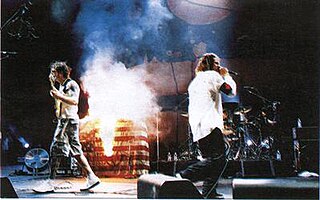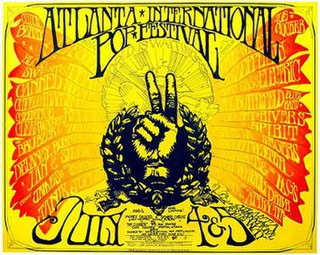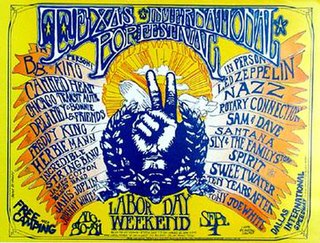Related Research Articles

Woodstock Music and Art Fair, commonly referred to as Woodstock, was a music festival held during August 15–18, 1969, on Max Yasgur's dairy farm in Bethel, New York, United States, 40 miles (65 km) southwest of the town of Woodstock. Billed as "an Aquarian Exposition: 3 Days of Peace & Music" and alternatively referred to as the Woodstock Rock Festival, it attracted an audience of more than 400,000 attendees. Thirty-two acts performed outdoors despite sporadic rain. It was one of the largest music festivals held in history.

Woodstock '94 was an American music festival held in 1994 to commemorate the 25th anniversary of the original Woodstock festival of 1969. It was promoted as "2 More Days of Peace and Music". The poster used to promote the first concert was revised to feature two doves perched on the neck of an electric guitar, instead of the original one dove on an acoustic guitar.

Woodstock '99 was a music festival held from July 22 to July 25, 1999, in Rome, New York. After Woodstock '94, it was the second large-scale music festival that attempted to emulate the original 1969 Woodstock festival. Like the previous festivals, it was held in upstate New York, this time at the former Griffiss Air Force Base roughly 100 miles (160 km) from the original Woodstock site. The attendance was approximately 220,000 over four days.

A rock festival is an open-air rock concert featuring many different performers, typically spread over two or three days and having a campsite and other amenities and forms of entertainment provided at the venue. Some festivals are singular events, while others recur annually in the same location. Occasionally, a festival will focus on a particular genre, but many attempt to bring together a diverse lineup to showcase a broad array of popular music trends.
The Altamont Speedway Free Festival was a counterculture rock concert in the United States, held on Saturday, December 6, 1969, at the Altamont Speedway outside of Tracy, California. Approximately 300,000 attended the concert, and some anticipated that it would be a "Woodstock West". The Woodstock festival had been held in Bethel, New York, in mid-August, almost four months earlier.

John Dawson Winter III was an American singer and guitarist. Winter was known for his high-energy blues rock albums and live performances in the late 1960s and 1970s. He also produced three Grammy Award-winning albums for blues singer and guitarist Muddy Waters. After his time with Waters, Winter recorded several Grammy-nominated blues albums. In 1988, he was inducted into the Blues Foundation Hall of Fame and in 2003, he was ranked 63rd in Rolling Stone magazine's list of the "100 Greatest Guitarists of All Time".
Long Pond is an unincorporated community in Monroe County in the Pocono Mountains region of Pennsylvania, a part of the Appalachian Mountains. Long Pond is located within the Tunkhannock Creek Watershed. Its ZIP code is 18334.

Max B. Yasgur was an American farmer. He was the owner of the 600-acre (240 ha) dairy farm in Bethel, New York, where the Woodstock Music and Art Fair was held on August 15–18, 1969. He sold his farm in 1971 and retired to Florida, where he died in 1973.

The Powder Ridge Rock Festival was scheduled to be held July 31, August 1 and August 2, 1970 at Powder Ridge Ski Area in Middlefield, Connecticut. A legal injunction forced the event to be canceled, keeping the musicians away; but a crowd of 30,000 attendees arrived anyway, to find no food, no entertainment, no adequate plumbing, and at least seventy drug dealers. William Manchester wrote: "Powder Ridge was an accident waiting to happen, and it happened." Volunteer doctor William Abruzzi declared a drug "crisis" on August 1, saying "Woodstock was a pale pot scene. This is a heavy hallucinogens scene."

The Goose Lake International Music Festival held August 7–9, 1970 in Leoni Township, Michigan, "was one of the largest music events of its era", and featured many of the top rock music bands of the period.

The first Atlanta International Pop Festival was a rock festival held at the Atlanta International Raceway in Hampton, Georgia, twenty miles south of Atlanta, on the July Fourth (Friday) weekend, 1969, more than a month before Woodstock. Crowd estimates ranged from the high tens of thousands to as high as 150,000. With temperatures nearing a hundred degrees, local fire departments used fire hoses to create "sprinklers" for the crowd to play in and cool off. It was a peaceful, energetic, hot and loud festival with few problems other than heat related. Concession stands were woefully inadequate. Attendees frequently stood in line for an hour to get a soft drink.

The second Atlanta International Pop Festival was a rock festival held in a soybean field adjacent to the Middle Georgia Raceway in Byron, Georgia, from July 3–5, 1970, although it did not finish until after dawn on the 6th. It was the only successor to the first Atlanta Pop Festival, which had been held the previous summer near Hampton, Georgia. The event was promoted by Alex Cooley, who had helped organize the '69 Atlanta festival as well as the '69 Texas International Pop Festival, and two years later would promote the Mar Y Sol Pop Festival in Puerto Rico from April 1–3, 1972.

Michael Scott Lang was an American concert promoter, producer, and artistic manager who was best known as a co-creator of the Woodstock Music & Art Festival in 1969. Lang served as the organizer of the event, as well as the organizer for its follow-up events, Woodstock '94 and the ill-fated Woodstock '99. He later became a producer of records, films, and other concerts, as well as a manager for performing artists, a critically acclaimed author, and a sculptor.
The Summer Jam at Watkins Glen was a July 1973 rock festival outside Watkins Glen, New York, that featured the Allman Brothers Band, Grateful Dead and the Band. The July 28, 1973 event long held the Guinness Book of World Records entry for "largest audience at a pop festival," with an estimated 600,000 fans in attendance at the Watkins Glen Grand Prix Raceway. Approximately 150,000 tickets were purchased in advance, the rest being admitted in what became a "free concert".

The Texas International Pop Festival was a music festival held at Lewisville, Texas, on Labor Day weekend, August 30 to September 1, 1969. It occurred two weeks after Woodstock. The site for the event was an open field just south and west of the newly opened Dallas International Motor Speedway, located on the east side of Interstate Highway 35E, across from the Round Grove Road intersection.

Roosevelt Raceway was a race track located just outside the village of Westbury on Long Island, New York. Initially created as a venue for motor racing, it was converted to a ½-mile harness racing facility. The harness racing facility operated from September 2, 1940 until July 15, 1988. It was the original home of the Messenger Stakes, part of the Triple Crown of Harness Racing for Pacers. The raceway hosted the event until it closed. It was also the first track to use the now universal "mobile starting gate". The operation was sold in 1984 on the condition it was to remain an operating racetrack, but the facilities deteriorated, attendance dropped off, and the plant was no longer profitable.
Canada Jam was a rock festival concert held at Mosport Park in Bowmanville, Ontario Canada, about 100 kilometres east of Toronto, on August 26, 1978. The festival was produced by Sandy Feldman and Leonard Stogel, who produced California Jam and California Jam II, and was sponsored by Carling O'Keefe. It attracted over 110,000 fans, making it the largest paying rock event in Canadian history at that time. The Molson Canadian Rocks for Toronto a.k.a. "SARSfest" featuring the Rolling Stones and AC/DC eclipsed that mark with an audience of 450,000 people on July 30, 2003.
Woodstock Sound-Outs or soundouts were mini-festivals held outside Woodstock, NY from 1967 to 1970. They were the brainchild of John "Jocko" Moffitt, a roofer and drummer. He had heard about a number of folk festivals in his native California, and he wanted to stage a rock festival in a country setting. Planning for the event began in 1966 and by the early spring of 1967 performers like Richie Havens were being tentatively booked.

The New Orleans Pop Festival was a rock festival held on Labor Day weekend, two weeks after the Woodstock Festival. It was held at the Louisiana International Speedway in Prairieville, Louisiana, about 65 miles up the Mississippi River from New Orleans and 15 miles south of Baton Rouge. Over 26 bands performed during the three days of the festival, including seven veterans of Woodstock. It had a peak attendance of 25,000–30,000 people.
References
- Cayne, Bernard S., ed. (1973). The Americana Annual, 1973: An Encyclopedia of the Events of 1972. United States: Americana Corporation. p. 489. ISBN 0-7172-0204-6..
- Heckman, Don (July 10, 1972). "Another Woodstock? No: Concert 10 Satisfactory". The New York Times . p. 38..
- Lichtenstein, Grace (July 9, 1972). "200,000 Jam Rock Festival at Pocono Track". The New York Times . pp. 1, 36..